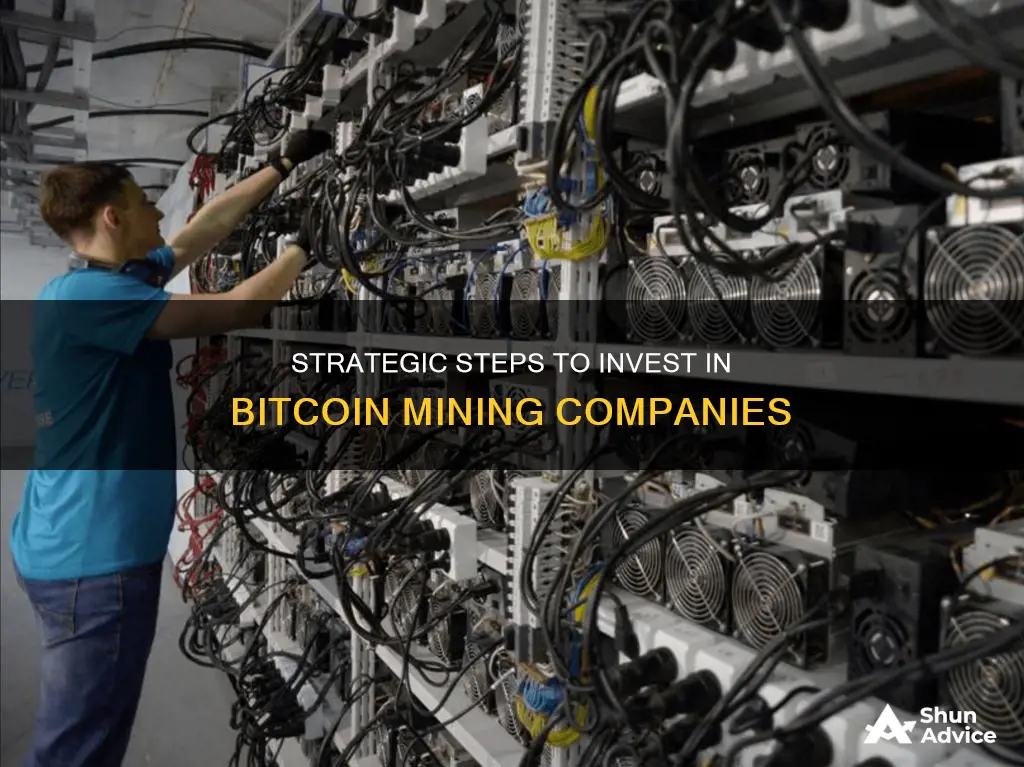
Bitcoin is a very risky asset type. It is extremely volatile, and even the most solid Bitcoin investment should be treated as a high-risk investment. The safest way to invest in Bitcoin is to buy and hold the actual coins in your personal wallet. However, there are other ways to invest in Bitcoin, such as mining. Mining Bitcoin has only been profitable if done on a large scale. This means getting expensive mining equipment and having access to free or very cheap electricity. Cloud mining, where a third-party company mines Bitcoin on your behalf, is another option, but most cloud mining companies are scams.
| Characteristics | Values |
|---|---|
| Risk | Bitcoin is a very risky asset type. Its price has fallen over 80% in the course of several months throughout its existence. |
| Investment Options | 1. Buying and holding (aka hodling) 2. Trading 3. Mining |
| Buying and Holding | 1. Never invest more than you are willing/able to lose 2. After buying, move Bitcoins into your own wallet and never leave them on an exchange 3. Use Dollar cost averaging (DCA) 4. If you are a US citizen, consider investing in a Bitcoin IRA |
| Trading | Requires knowledge and practice. The market is occupied by very large players. |
| Mining | Requires expensive mining equipment and access to free or very cheap electricity. |
What You'll Learn

Risks and volatility of investing in Bitcoin
Bitcoin is a highly volatile asset. In its 15 years of existence, it has shown signs of maturation, but it is still in the price discovery phase. Its price fluctuates due to supply and demand, investor and user sentiments, government regulations, and media hype.
Volatility
Bitcoin's price volatility is extreme and almost 10 times higher than the volatility of major exchange rates (US dollar against the euro and the yen). This excess volatility prevents Bitcoin from performing all the functions associated with a currency, such as a medium of exchange, unit of account, and store of value.
The volatility of Bitcoin is driven by several factors, including:
- Google Trends: The interest in Bitcoin, as reflected in Google search trends, can impact its volatility.
- Total circulation: The limited supply of Bitcoin, with a cap of 21 million coins, can affect its volatility as the circulating supply gets closer to this limit.
- Consumer confidence: The confidence of consumers in the US and other countries can influence the volatility of Bitcoin.
- S&P 500 index: The performance of the stock market, as measured by the S&P 500 index, can also impact Bitcoin's volatility.
- Investor sentiment: The sentiment of investors, including fear and greed, can drive Bitcoin's volatility.
- Media hype: Media outlets, influencers, and industry experts can create investor concerns, leading to price fluctuations.
- Government regulations: Changes in government policies and regulations, such as China's ban on cryptocurrency transactions, can cause significant price swings.
- Cyberattacks: Bitcoin exchanges are vulnerable to cyberattacks, which can impact the confidence of investors and lead to volatility.
Risks
Investing in Bitcoin carries several risks due to its volatility and the regulatory environment surrounding cryptocurrencies:
- Regulatory risk: Changes in government policies and regulations can significantly impact the value of Bitcoin. For example, the approval of Bitcoin-related securities can drive up prices.
- High volatility: The extreme volatility of Bitcoin makes it a risky investment, with the potential for significant gains or losses.
- Limited liquidity: Bitcoin is a relatively new and less liquid asset compared to traditional investments, which can make it challenging to convert it back into cash.
- Tax implications: The tax treatment of Bitcoin varies across countries, and taxes must be paid when using it, impacting its market price.
- Competition from stablecoins: The emergence of stablecoins, such as Tether and Libra, could pose a threat to Bitcoin's dominance and impact its price.
- Cybersecurity risks: Bitcoin exchanges are vulnerable to cyberattacks, which can result in financial losses for investors.
- Sentiment-driven price movements: Investor sentiment, including fear of missing out or panic selling, can drive price movements, leading to volatile price swings.
- Maturation of the asset class: As Bitcoin matures and its market cap grows, the impact of new capital inflows on its price is expected to diminish.
In conclusion, investing in a Bitcoin mining company carries significant risks and volatility due to the unpredictable nature of the cryptocurrency market and the regulatory environment. Investors should carefully consider these factors before deciding to invest in Bitcoin-related companies.
Cashing Out Your Bitcoin: Strategies for Profitable Withdrawals
You may want to see also

Buying and holding Bitcoin
Step 1: Choose a Crypto-Trading Service or Venue
You can purchase bitcoin from cryptocurrency exchanges, such as Gemini, Kraken, Coinbase, and Crypto.com. These exchanges carry a variety of different fees and consumer protections, so it is important to do your research before choosing one.
Step 2: Connect Your Exchange to a Payment Option
At most exchanges, you can connect your bank account directly or link it to a debit or credit card. Although you can use a credit card to purchase cryptocurrency, it is not recommended due to the potential for high interest and processing fees.
Step 3: Place an Order
Almost all crypto exchanges offer market and limit orders, and some also provide stop-loss orders. Exchanges also offer ways to set up recurring investments, allowing clients to dollar-cost average into their investments of choice.
Step 4: Safe Storage
It is important to ensure the safe storage of your purchased Bitcoin. You can use a hot wallet or a cold wallet. Hot wallets are online wallets that are apps on devices such as computers, phones, or tablets. They are convenient and allow for faster transactions, but they are more vulnerable to security breaches. Cold wallets, on the other hand, are offline wallets that are not connected to the internet, such as hardware or paper wallets. They provide greater security but are less convenient for frequent transactions.
Things to Keep in Mind
- Privacy and security are important when dealing with Bitcoin and other cryptocurrencies. Keep your private keys and passwords secure and confidential.
- Be aware of the legal, regulatory, and tax implications of purchasing and holding Bitcoin in your jurisdiction.
- Consider the risks and potential rewards of investing in Bitcoin. It is a volatile and risky investment, so it is important to understand what you are investing in and to not invest more than you are comfortable losing.
- When creating accounts and wallets, always use strong passwords and two-factor authentication for added security.
A Beginner's Guide: Investing $500 in Bitcoin
You may want to see also

Bitcoin investment scams
- Fake Celebrity Endorsements: Scammers use real photos of celebrities and impose them on fake accounts, ads or articles to make it seem like the celebrity is promoting a large financial gain from the investment.
- Rug Pull Scams: Scammers "pump up" a new project, non-fungible token (NFT) or coin to get funding. After they get the money, they disappear with it.
- Dating Scams: Scammers gain your trust and convince you to give them money in some form of cryptocurrency.
- Phishing Scams: Scammers send emails with malicious links to a fake website to gather personal details, such as cryptocurrency wallet key information.
- Ponzi Schemes: Scammers lure in new investors with bitcoin and use their money to pay off older investors.
- Fake Cryptocurrency Exchanges: Scammers lure investors in with promises of a great cryptocurrency exchange and additional bitcoin.
- Employment Scams: Scammers impersonate recruiters or job seekers to gain access to cryptocurrency accounts.
Strategies for Choosing the Right Crypto Coin
You may want to see also

Mining Bitcoin at home
The Process of Bitcoin Mining
Bitcoin mining is the process of validating and recording transactions on the Bitcoin blockchain. Miners use hardware and software to generate cryptographic numbers that are equal to or less than a number set by the Bitcoin network's difficulty algorithm. The first miner to find the solution receives bitcoins as a reward, and the process begins again. This is how new bitcoins are introduced into the system.
Hardware and Software Requirements
Bitcoin mining requires substantial hardware and software. Miners need a powerful graphics processing unit (GPU) or an application-specific integrated circuit (ASIC). GPUs can range in price from $1,000 to $2,000, while ASICs can cost tens of thousands of dollars.
Electricity Costs
The high energy requirements of Bitcoin mining can result in significant electricity costs, especially for residential miners who don't have access to low-cost power sources like institutional miners.
Competition and Probability
The probability of discovering the solution to the cryptographic puzzle is related to the network's total mining capacity. With the majority of mining capacity owned by large mining firms and pools, individual miners have a very small chance of finding the next block and receiving a reward.
Mining Pools
To increase their chances of success, individual miners often join mining pools, where they combine their hash rate (a measure of computing power) and share the Bitcoin reward based on their contribution.
Alternative Cryptocurrencies for Home Mining
While mining Bitcoin on an individual computer is no longer viable due to the high difficulty and specialised hardware, there are other cryptocurrencies that can be mined at home. These include Dogecoin, Ethereum Classic, Monero, Zcash, and more. These cryptocurrencies have lower barriers to entry and can be mined with a home computer or GPU, making them more accessible to individual miners.
Smart Places to Invest Your Bitcoin Cash
You may want to see also

Bitcoin mining equipment
When purchasing Bitcoin mining equipment, it's essential to consider the following factors:
- Hash Rate: As mentioned, the hash rate is the key performance metric for Bitcoin mining equipment. It determines how quickly your machine can mine Bitcoin and, consequently, its profitability.
- Power Consumption: Bitcoin mining machines require significant amounts of electricity to operate. It is important to consider the power consumption of the machine and the cost of electricity in your region, as this will impact your overall profitability.
- Cooling System: Bitcoin mining machines generate a lot of heat, and a proper cooling system is necessary to prevent overheating. Look for machines with multiple cooling fans to ensure optimal temperature control.
- Noise Levels: Some Bitcoin mining machines can be extremely loud, which may be a concern if you plan to operate them in a residential area. Look for machines with lower noise levels or consider setting up your operation in a dedicated facility.
- Price: Bitcoin mining machines vary in price, and it's important to balance this investment with the potential profitability of the machine. More expensive machines often offer higher hash rates and better energy efficiency but may require a larger upfront investment.
- Antminer S19 Pro: The Antminer S19 Pro is one of the best options available, offering a high hash rate of 110 Th/s. However, it is also one of the more expensive options.
- Antminer T19: The Antminer T19 strikes a balance between efficiency and affordability. While it has a slightly lower hash rate than the S19 Pro, it is available at a more accessible price point.
- Dragonmint T1: The Dragonmint T1 is a powerful option, delivering a hash rate of 16TH/s while consuming relatively low power. It is a good choice for those looking for high performance without excessive power draw.
- AvalonMiner 1246: The AvalonMiner 1246 is another fast machine with a high hash rate. However, it also has high power consumption and noise levels, making it more suitable for advanced miners or dedicated mining facilities.
- Whatsminer M30S++: The Whatsminer M30S++ is one of the most powerful options available, offering an impressive hash rate of 112TH/S. However, it is also more expensive and power-intensive, making it better suited for experienced miners.
When investing in Bitcoin mining equipment, it is crucial to consider your specific needs, the cost of electricity in your region, and the potential profitability of each machine. Online profitability calculators can help you estimate the expected returns based on hash rate, power consumption, and other factors.
The Ultimate Guide to Investing in Bitcoin
You may want to see also
Frequently asked questions
The safest way to invest in Bitcoin is to buy and hold the actual coins in your personal Bitcoin wallet.
Bitcoin is a very risky asset type. It is extremely volatile, and even the most solid Bitcoin investment should be treated as a high-risk investment.
Never invest more than you are willing/able to lose, and make sure to move your Bitcoins into your own wallet instead of leaving them on an exchange.
Bitcoin trading, which involves actively buying Bitcoin at a low price and selling it at a higher price over short time intervals, is a common alternative.







